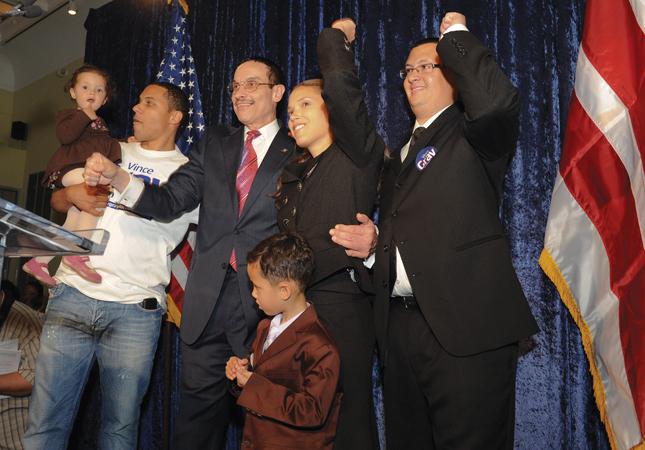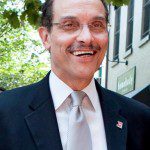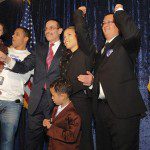One On One With Vince
By • July 26, 2011 0 2993

Walk into the offices of DC City Council Chairman Vincent Gray, and it’s like walking into two different
worlds.
Along a small corridor of offices and cubicles, there are people talking on the phone; computers are on. It’s got all the signs of any busy bureaucratic office. Walk into his office, with Gray leading the way, and the busy sounds die down. His office is reminiscent of an expansive drawing room — leather chairs, a large desk, books and pictures on the wall.
The two-world metaphor works in another way now: Gray, who prevailed over incumbent Mayor Adrian Fenty in the race for the Democratic mayoral nomination on September 14, now has his feet in two different places. He’s still the Council Chairman, but he’s also the presumptive mayor of the District of Columbia.
It’s presumptive because usually, in this heavily Democratic city, if you win the Democratic Party’s nomination you become mayor. There are only ever nominal Republican or third-party opposition in the general election, which this year is November 2. This will probably be the case again, even though some disaffected folks have started a Fenty write-in website.
“People don’t know what to call me or how to describe my status,” Gray joked as we settled in for an interview.
Gray’s victory has unsettled people. While it’s sometimes jarring even to Gray, it’s even more jarring to Fenty supporters and supporters of DCPS Chancellor Michelle Rhee, who had trouble imaging such a result ever coming to pass. Some of the same people have painted the results in the darkest of terms.
That included Rhee, who at first, in the aftermath of the Newseum’s premiere of “Waiting for Superman”, used the word “devastating” describing the election results. Of course she later backtracked.
Gray, who says he hasn’t yet seen the film, said that he’s not making personnel decisions at the moment. So the oft-asked question about Rhee’s status, asked almost routinely throughout the campaign, goes largely unanswered when I asked it yet again. “I know, I know,” he said. “But I haven’t made a decision on that yet. Honestly, when she and I met we didn’t talk about any of that. We talked about educational issues, education philosophy, ideas about schools and children and teachers. It was a pretty far-ranging conversation, so we didn’t get to that. We’ll obviously be talking again.” But if pictures and video of the two emerging from their recent meetings were any indication
— the two literally stood at some distance from each other, and Rhee left quickly — than clearly the discussions had some heft to them.
“Right now, nothing is off the table,” Gray said. Asked if that included Rhee staying on as chancellor, in some form or another, he said, “I haven’t ruled it out.”
As usual, Gray is being deliberative, not making up his mind quickly even if there is a certain amount of pressure — most of it coming from the media.
“Sometimes, it’s hard to believe that we are where we are,” Gray said. “I feel most of the time incredibly humbled by what’s transpired, but I was confident in making that decision to run. I never thought we couldn’t win. And as those first polls about the mayor surfaced, and later on, it was pretty clear to me that there were a lot of unhappy people out there, some angry people.”
“Of course, when some early polls came in election night they had us behind,” he said. “That had a chilling effect, to say the least.”
Back in the summer, when we first had a long conversation with Gray at the Busboys and Poets site near his campaign headquarters, he stated emphatically that this city was more divided today than at any time in its history of home rule. He turned out to be acutely accurate.
“I get these questions all the time,” he said. “What are you going to do about Marion Barry? Are we going to go back to the old politics? That sort of thing.”
“I understand that, believe me. But…people should remember that I wasn’t part of all that. I’m not a career politician, who’s been doing this stuff all of my life. I didn’t run for office until 2004, the first time,” he said. “And when it comes to Mr. Barry, I’m interested in responding to the needs of his constituents, as well as the constituents in all of the city’s wards. I’m not obligated to Mr. Barry.”
It’s fair to say he proved that earlier this year, when Mr. Barry once again came under fire, and the council as a whole voted to censure Barry and strip him of his committee chair position. When the vote came, it was Gray who handled it with both dignity and toughness, unwavering, because it was the correct thing to do, in spite of Mr. Barry’s emotional importuning during the proceedings.
“We did what we had to do. People seem to forget that,” Gray said.
There is certain toughness in Gray that isn’t always readily self-evident. He has what in old-school terms you might call good manners, but there are fires burning there. A widower, he’s lived alone, in a house in the Hillcrest neighborhood, in Ward 7 since the death of his wife Loretta, a schoolteacher, in 1998. He has almost a courtly way about him. He’s a man who believes in observing the formalities.
There’s almost an idiosyncratic dynamic about him. You saw it in the campaign. He carries himself with authority and confidence, fully aware of the importance of position and endeavor. But at the same time, he has the very quality that many people thought Fenty lacked: a consideration for and curiosity about people.
At candidate forums, he could get prickly and combative, but he also looked like somebody that was enjoying himself. His theme is that he will run a One-City government, inclusive of the participation and the views of others. “Don’t stand on the sidelines,” he urges people when it comes to issues. “Be a part of the debate, a part of the discussion.” Put him in a parade, and he might take hours to get through, as you could see, at the Adams Morgan Festival, two days before the election. His supporters surged forward only to lose the candidate, who had been buttonholed by someone he knew, jaw-boning as the parade passed by.
“Yeah, I guess it does take me a while to get through a parade,” he said. “I just think it’s important to talk with people and even more important to listen.”
He knows he’s got his work cut out for him. “We’re facing a huge $175 million budget deficit
— more than that I’m told — and we need everybody working together on that. We’re all in this together.”
He knows too that the election results, which showed him winning by huge margins in the mostly black wards and losing by large margins in the mostly white ward, exposed the great divide that he had identified. “It’s not just race. It’s economic; it’s perceptions of government,” he said. Nationally, his win was being touted by media types as a rejection of education reform.
Gray typically resented that notion. “That’s just not an accurate perception or reality,” he said. “I am firmly committed to education reform, and I think a lot of good things have already been done in that direction. The election wasn’t about whether or not to reform the schools or that they needed reform. They did. I want to continue to do that. In fact, I want education reform to expand to include early education, [with] more emphasis on charter schools, vocational schools. We have to tackle the other issues that impact schools — the lack of jobs in the poor wards. It’s disgraceful. My approach, I think, is a little more holistic.”
“We’re going to move forward,” he said. “Make no mistake about that.”
Gray’s vision of “One City” was tested in a previous race for the council chairmanship. There he defeated Kathy Patterson, the council member from predominantly white Ward 3, by a double-digit margin. “One City” was put into practice again this week, when he embarked on the first of eight promised town hall meetings across all of the city’s wards.
“We’re going to be there to listen to people,” he said. “We’ll have groups on different topics so that there won’t be redundancy. I want to know what’s on people’s minds — what they’re concerned about when it comes to myself.”
“I want to be the man that unites the city,” he said. “I want people to feel that they’re not forgotten — that they’re part of the debate, part of the discussion.”
He also said that he would revive Mayor Anthony Williams’ Citizens Summit, probably in November, in which residents from all wards can come together to provide input on planning and budget issues.
Gray is known as a consensus seeker, deliberative, and even “plodding,” as one critic described it. “That’s not it at all,” he said. “Leadership to me is not just about making decisions per se. It’s about making decisions and getting people to come with you — to understand what you’re doing, hopefully by inspiring people.”
Gray knows he’s walking a bit of a tightrope — allaying the fears of the people who voted against him while meeting the expectations of the people who voted for him.
“I think my wife would have warned me not to get a big head,” he said. “But I can tell you this much, nobody has to worry that I’m going to be wearing a hat that doesn’t fit me.”
There’s a solidity about the man. It’s not that he’s got a thousand close friends but that he has a solid life; his children, Jonice Gray Tucker and Vincent Carlos Gray, and grandchildren are proudly exhibited in photographs on the wall. There’s his Catholic faith and his best friend Lorrain Green, who was his campaign chairman and “the person I’ll talk with, go over things with” he said. “I’ve known her for 20 years or more.” Gray, who once was a highly touted high school baseball player at Dunbar High School — enough to make major league scouts look at him — still plays in a Washington Recreation League at first base. “Keeps me in shape,” said Gray, who at 67 is the city’s oldest elected mayor. He also has a cat named Samurai and is, apparently, known to be quite the hand-dancer.
Dignity and respect mean a lot to him. “I’ve always believed you treat people with respect,” he said. “Everyone.”
- Vince Gray and his family, the evening he clenched the Democratic Mayoral candidacy | Photo by Jeff Malet



